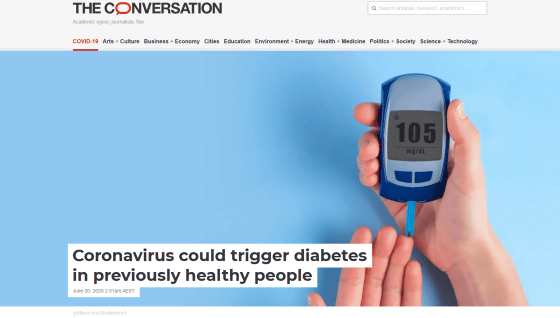'If you are infected with the new coronavirus, even healthy people may develop diabetes,' researchers pointed out.

It has been found that new coronavirus infection (COVID-19) does not necessarily make people who develop it more severe, and that the elderly and people with chronic illnesses are particularly vulnerable.
New-Onset Diabetes in Covid-19 | NEJM
https://www.nejm.org/doi/full/10.1056/NEJMc2018688
Coronavirus could trigger diabetes in previously healthy people
https://theconversation.com/coronavirus-could-trigger-diabetes-in-previously-healthy-people-140886

Researchers from Europe, America, Oceania, Asia, and Africa said in a statement released in the New England Journal of Medicine on June 12, 2020, 'There is a two-way link between COVID-19 and diabetes.' Pointed out.' While diabetes increases the risk of COVID-19 becoming more severe, patients with COVID-19 may lose their ability to control blood glucose levels and may need to take insulin.
There are two main types of diabetes. Type 1 diabetes is a disease caused by an autoimmune disease in which the immune cells of one's own cells destroy the β cells of the pancreas due to some effect, and the β cells cannot secrete insulin and the blood sugar level rises. On the other hand, in type 2 diabetes, the amount of insulin secretion and the efficacy of insulin decrease due to unhealthy eating habits and overeating, resulting in hyperglycemia.
It has long been known that type 1 diabetes can be caused by viral infection. It is believed that the viral infection causes a chronic immune response and destroys insulin-secreting β-cells. It has also been pointed out that type 1 diabetes, like some viral infections, has a seasonal onset.

Prior to COVID-19, it was reported that a patient infected with SARS coronavirus , a pathogen of severe acute respiratory syndrome (SARS) that had been circulating in 2003, developed acute diabetes that was not seen in other pneumonia. It was A 2009 study found that although many people who developed diabetes due to SARS coronavirus infection had their diabetes subsided within three years, 10% continued to have it.
The new epidemic of new coronavirus enters cells in the same way as SARS coronavirus. Both viruses are infected by a process called a spike protein on the surface that binds to the angiotensin converting enzyme 2 (ACE2) receptor, which is abundant in human lung, kidney, and pancreatic cells. At this time, when the virus enters the pancreas, it causes inflammation, destroys normal cell functions, loses the ability to secrete insulin to regulate blood glucose levels, and may develop diabetes.
In China, a case has already been reported in which acute diabetes was developed due to infection with a novel coronavirus, resulting in diabetic ketoacidosis caused by insulin deficiency.

However, at the time of writing the article, there is insufficient data on the development of new coronavirus and diabetes, so it cannot be declared whether the new coronavirus causes diabetes. It is also unknown whether the type of diabetes that may be caused by the novel coronavirus is type 1 diabetes, type 2 diabetes, or a new type of diabetes. Regarding the development of new coronavirus and diabetes, future data collection is indispensable.
Related Posts:
in Science, Posted by log1h_ik







